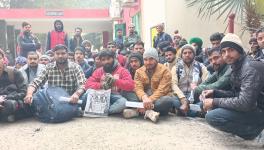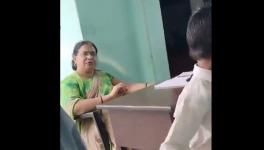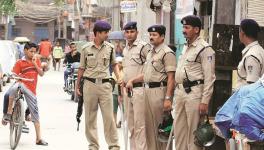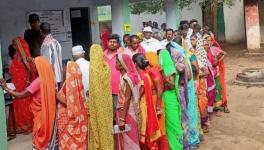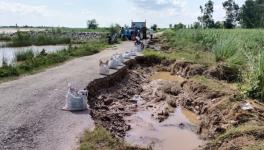UP Elections: Is Cow Slaughter Act Being Misused in Bijnor to Falsely Frame Muslims?
Bijnor: A 38-year-old father of four, Naseer Ali (name changed), has not been staying with his family very often, fearing arrest in connection with an alleged cow slaughter and gangster case lodged against him.
About two years ago, Ali spent had spent three months in jail. As a result, his family went through an acute financial crisis, resulting in his teenaged daughters taking up the daily wage jobs. He claims he was externed using the Goonda Act by the UP police for six months due to allegations against him.
"I was taking a stroll after dinner in my village when a policeman approached and asked me to sit in a jeep. I resisted and asked him why, but he did not tell me the reason. In a terse tone, he asked me to sit in the jeep. I obeyed him because he was a policewallah (a policeman). A boy from our neighbouring village was sitting in the jeep, and they picked another boy from our village. We were taken to the police station, challaned and sent to jail," he claims.
Ali said he got to know about the allegations only after being sent to jail.
"I kept on asking the police authorities what my crime was while we were sitting in the police station. The other boy sitting in the police jeep was let go by the police, but we were kept in custody. They did not tell us the reason for the arrest," he added.
As per government data available till October 2020, a total of 76 people were booked under the Cow Slaughter Act in the state. Almost every accused was also slapped with the controversial Gangster Act and Goonda Act.
The Gangster Act is a controversial law in the state and has been invoked rather indiscriminately against land mafias and journalists, among others.
The Allahabad High Court, on November 19, 2020, had criticised the UP police for invoking these laws (National Security Act (NSA), Gangster Act, Goonda Act) in "trivial matters" adding that it was being "misused by the police."
Advocate Kamaal Mashroof told NewsClick that it was very unfortunate that people like Ali, who belong to the marginalised sections of society, were being falsely booked under such stringent laws.
"Violating the Allahabad High Court's ruling, the police slaps people booked in just one case with Gangster Act, Goonda Act and even NSA," he said.
Mashroof said that Bijnor district in Western Uttar Pradesh, about 183 kilometres from the national capital of New Delhi, had the maximum number of police cases registered under the Cow Slaughter Act under the present regime.
"The district was infamous for cow slaughtering. But it stopped under the present government. Still, many cases registered by the police are false. The families of those accused are suffering due to these cases,” Mashroof said, adding, "The other reason for a large number of cases is because of active fringe organisations in these areas. As per my knowledge, the police could not prove the kind of meat that has been allegedly recovered in most of these cases. The police also take action on complaints made by fringe elements without doing deep investigation, just to get a pat on their backs by higher ups."
As regards Ali’s case, the advocate, who is representing the accused, told NewsClick that his client was not on the spot when the incident of cow slaughtering happened, as per the date and time mentioned in the FIR, and his client had an alibi for it.
"There are different versions in the police case diary, and we have challenged it in the court of law. The record or facts related to the forensic examination of the meat in question have also not been disclosed. My client has faith in the judiciary. I am sure that the court will do justice to this family," Mashroof said.
The UP government had in June 2020 approved a draft ordinance, providing maximum rigorous imprisonment of 10 years and a monetary fine of up to Rs 5 lakh in cow slaughter cases.
The ordinance copy read, "The ordinance aims at making the existing law (Uttar Pradesh Cow laughter Act, 1955) more robust and effective and to completely stop the incidents pertaining to the cow slaughter."
In another case in the neighbouring Shamli district, a farmer, Rahmuddin, was jailed for 75 days. He was booked for cow slaughter and later slapped with NSA.
Rahmuddin got bail on October 19, 2020, from the Allahabad High Court. But, he is still scared and feels vulnerable all the time. The bail order cited Article 21 of the Indian Constitution for his release from jail.
Onkar Singh, the lawyer who represented Rahmuddin's case in the Allahabad High Court, said the police were misusing the law, including NSA, against 'innocent people'.
He alleged that the state police was especially targeting Muslims in cow slaughter cases.
Shadan Farasat, a New Delhi-based advocate, practicing in the Supreme Court, while explaining the NSA, said: "It is an act where a person can be detained and sent to jail only on the apprehension of a crime which can be a threat to national security. The person can be arrested without the commission of crime no matter how clean their criminal records are."
"It is a law of preventive detention. There is no bail provision in this act. The person can be jailed for three months, six months or a maximum of one year. The slapping of NSA can be challenged in the court through a writ because the grounds on which it can be imposed are very limited," he said.
On the question of rampant use of NSA in UP, Farasat said: "The obvious mechanism is that the government does not want to be questioned. The use of NSA has to be done for public or national security threats. There should be specific inputs that this person is going to do something, then you can put NSA, but rampant use against people who are against the government view ideologically or otherwise is a misuse of the act and NSA is not meant for such cases," he said.
The Uttar Pradesh Prevention of Cow Slaughter Act, 1955, was implemented on January 6, 1956, and amended in 1958, 1961, 1979 and 2002. The rules were amended in 1964 and 1979.
There are four more people in the village who the police have booked for the same crime, and their cases are in court. While the district votes today in the second phase of polling for the Assembly elections, this issue has failed to find any place in the key opposition's political campaign, which has made the victims of this draconian law a bit disheartened.
Get the latest reports & analysis with people's perspective on Protests, movements & deep analytical videos, discussions of the current affairs in your Telegram app. Subscribe to NewsClick's Telegram channel & get Real-Time updates on stories, as they get published on our website.











